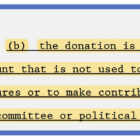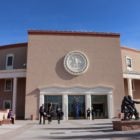Ethics
NM In Depth editors and reporters discuss government transparency, ethics and the Governmental Conduct Act
|
New Mexico In Depth editors held the third of five online chats about the 2024 legislative session last week. Professor of Practice of Journalism at the University of New Mexico, and occasional contributor to New Mexico In Depth, Gwyneth Doland, joined Executive Director Trip Jennings and Managing Editor Marjorie Childress to discuss government transparency, legislative modernization efforts, and the Governmental Conduct Act. Doland kicked off the conversation talking about the 14 students she takes to the Roundhouse every Wednesday and their experience thus far. “It’s interesting and cool to see things through their eyes,” she said, while noting that for newcomers, navigating the state capitol during a legislative session can be a lot to take in.
The three discussed efforts over the past 15 years to make the statehouse more accessible and understandable, including webcasting, budget transparency efforts, and showing what is stricken or added through amendments lawmakers adopt to change legislation, and making bills easier to track. One step backwards Jennings mentioned is that certain areas of the capitol have been closed to the public, making it more difficult to reach lawmakers for a conversation.






